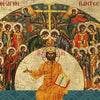Who is the Great Saint “adoptive” father of Jesus

2021 Year of St Joseph
The proclamation of 2021 as the Year of St. Joseph by Pope Francis means much more than a simple anniversary tribute to the most beloved, loving and obedient father: The adoptive father of Jesus who has been canonized by both the Orthodox and the Catholic Church. The Pope’s intention is to indicate the importance of simplicity, patience, hope and co-responsibility at this critical time for humanity due to the pandemic and the global economic crisis. At this critical predicament, another figure is being commemorated alongside Saint Joseph. It is "the man who goes unnoticed, the everyday man, with the silent and discreet presence".
According to the New Testament, Joseph, was betrothed to the Theotokos. As a descendant of David, Joseph was from Bethlehem as well, but lived in Nazareth. Following the birth of Christ, he settled with Virgin Mary in Egypt, as a Lord's angel informed them of Herod’s decision to slaughter every newborn child. After Herod's death, they all returned to Nazareth. The last mention of Joseph in the New Testament is during the journey back from Jerusalem, when the twelve-year-old Jesus was found teaching in the Temple. His memory is celebrated on the first Sunday after Christmas as well as on 19th Match.
Pope’s letter
Let us start from the beginning. A few months ago, in December 2020, Pope Francis signed an apostolic letter with the title “Patris corde – With the heart of a father”. In this letter he commemorates the 150th anniversary of the proclamation of St Joseph the Betrothed as the Patron of the Catholic Church by Blessed Pius IX on 8th December 1870 through the latter’s “Quemadmodum Deus” decree. Pope Francis’ letter ends by announcing that year 2021 would be dedicated to St Joseph, “this hardworking Saint with the creative courage, a father in the shadows”.
Special indulgences during the “Year of St Joseph”
Following the apostolic letter “Patris corde”, the Apostolic Penitentiary announced that during the “Year of St Joseph” the Holy See has granted special indulgences. Specific instructions were provided especially for the days that St Joseph is celebrated throughout the year, such as 19th March and 1st May, as well as for those in sickness and the elderly “in the current context of health emergency”.
“A tender, loving and obedient father”
St Joseph particularly expressed his fatherhood “by making his life a sacrificial service to the mystery of the incarnation and its redemptive purpose”. Standing “at the crossroads between the Old and New Testaments” St Joseph is loved by the Christian people. In Joseph, “Jesus saw the tender love of God”, the tender mercy through which “we must learn to look upon our weakness sincec this is the part of the entire economy of salvation”.
As the Pope points out, “only tender love will save us from the snares of the accuser”. That is why it is so important to encounter God’s mercy, especially in the Sacrament of Reconciliation, where we experience his truth and tenderness, because “God’s truth does not condemn, but instead welcomes, embraces, sustains and forgives us”.
“Example of patience”
Joseph becomes a father by obeying God. With his concession to the divine plan, he saves the Virgin Mary and Jesus and teaches his Son “to do His Father’s will”. Having being called by God to serve the person and mission of Jesus, “he cooperated in the fullness of time in the great mystery if salvation and is truly a minister of salvation”.
“A father that accepts the will of God”
At the same time, Joseph is an “accepting father”, because he accepted Mary unconditionally”. This is truly remarkable even on this day and age “where psychological, verbal and physical violence towards women is so evident” as mentioned by Pope.
Even though Joseph does not understand the bigger picture, he sets aside his reason by entrusting the Lord, embraces the course of all the mysterious events and makes them part of his own history.
The spiritual path of Joseph is not one that explains, but one that accepts without being passively resigned.
On the contrary, his courageous and firm figure through the Holy Spirit’s gift of fortitude makes him able “to accept life as it is, with all its contradictions, frustrations, and disappointments”. Through St Joseph’s life, God speaks to us: “Do not be afraid!” Faith gives meaning to every happy or sad event and establishes the knowledge that “God can make flowers spring up from stony ground”. St Joseph “does not look for shortcuts, but confronted reality with open eyes and accepted personal responsibility for it”. St Joseph’s attitude “encourages us to accept and welcome others as they are, without exception”, especially those who are weak.
“An example of love for the Church and the poor”
The Apostolic Letter “Patris Corde” continuous to point out the creative courage that signifies St Joseph. This emerges especially in the way difficulties are dealt with and how these difficulties can bring out resources unexpected to the man. As the Pope mentions, “the carpenter of Nazareth, knows how to turn a problem into a possibility by always placing his trust in the Divine Providence”. He knows how to deal with these difficulties of his family, like every other family, especially those of the immigrants.
In light of these St Joseph is “a very unique protector indeed” of those who, afflicted by difficulties, wars, hatred, persecutions, were forced to abandon their homelands. Joseph, as guardian of Jesus and Mary, “cannot be anything less than the protector of the Church”, Its sense of motherhood and the body of Christ. Consequently, every poor, needy, suffering or dying person, every strange, prisoner or sick is “the Child” that Joseph protects. It is through him that we should learn to “love the Church and the poor”.
A father that teaches “the dignity and the joy” of the work.
St Joseph was a carpenter that earned an honest living to provide to his family. Through his work, he teaches us “the value, the dignity and the joy of what it means to eat bread that is the fruit of one’s own labour”. Pope takes the opportunity, through the hardworking and honest spirit of St Joseph, to make an appeal in favour of work. “A burning social issue, even in nations that for decades have enjoyed a certain degree of prosperity”, the Pope signifies the urgency to understand the importance of dignified work, also as a means of participation in the work of salvation. “It becomes an opportunity for the fulfilment not only of oneself, but also of that primary cell of society which is the family”.
A working person, cooperates with God himself, thus becoming “a minor creator of the world around us”. Having this in mind, Pope urges everyone to “rediscover the value, the importance and the necessity of work”, in order to “bring forth a new normality from which no one is excluded”.
The loss of employment due to Covid-19 pandemic, the Pope asks from everyone “to review their priorities” and to commit to it so that no young person, no person at all, no family should be without work”.
“A father in the shadows”
Taking as a reference the book “The Shadow of the Father” by writer Jan Dobraczyński, the Pope describes Joseph’s relationship with Jesus as “the earthly shadow of the heavenly Father”. “Fathers are not born, but made”, says the Pope, “by taking up the responsibility to care for a child’s life”.
Unfortunately, in today’s society, “children often seem orphans, without a father”. They lack a father “to introduce them to life”, without holding them back or being possessive, but rather making them “capable of deciding for themselves, being free and achieving their aims”.
From this point of view, Joseph is called “most chaste” which as a meaning is the “opposite of being possessive”: He indeed knew “how to love with extraordinary freedom”, “how to not think of himself in order to focus instead on the lives of Jesus and Mary. He found happiness in self-sacrifice”.
Joseph stays silent, without ever being disheartened or expressing any complain, but performed “specific actions of trust”.
As a result, Pope marks that Joseph’s figure is considered an exemplary role model, especially in a world “that needs fathers and rejects teachers”. The world rejects those who confuse “authority with authoritarianism, service with servility, discussion with oppression, philanthropy with intervention, power with desctruction”.
A true father is the one “renounces any temptation to determine the life of his children” and respects their freedom, because such fatherhood, when experienced in fullness, renders the father “useless”, when “the son has become independent and can walk the paths of life by himself”. Being a father “is not an exercise of possession”, says the Pope, but rather “a sign that points to a greater fatherhood, the Heavenly Father”.
Ending with a revelation: St Joseph in Pope’s everyday prayer
The apostolic letter “Patris Corde” ends with a prayer to St Joseph and reveals as well an everyday practice in the life of the Pope. “For more than forty years” the Pope has been reciting a prayer to St Joseph the Betrothed “taken from a 19th century French prayer book of the Congregation of the Sisters of Jesus and Mary”. It is a prayer that “expresses devotion and trust” to St Joseph, as well as a “challenge” to him. This is because, as the Pope explains, the prayer ends with the following words:
“Let it not be said that I invoked you in vain, and show me that your goodness is as great as your power”.





